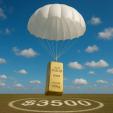Euro weakens as bonds climb on Greek concerns
London (May 11) The euro weakened and bonds climbed on concern that Greece will struggle to secure more aid. Asian stocks gained after China’s central bank cut interest rates for the third time in six months.
The euro weakened 0.4 per cent versus the US currency by 7:08 a.m. in London, and New Zealand’s dollar lost 1.5 per cent.
Ten-year Treasury yields dropped for a third day and the rate on similar German bunds fell two basis points. The MSCI Asia Pacific Index rose 0.3 per cent and the Shanghai Composite Index jumped 2 per cent. Standard and Poor’s 500 Index futures fluctuated and contracts on the Euro Stoxx 50 Index were little changed.
The bond market tantrum is showing signs of cooling off. After a selloff that lasted for most of the past two weeks, government securities are starting to recover.
Euro-area finance ministers meet Monday as resistance to further help for Greece builds. China is bolstering stimulus as data signal the world’s second-largest economy may struggle to meet its official growth target of about 7 percent.
US-payroll growth in April came in just below estimates the March gain was revised down to the lowest since 2012, further pushing back estimates for when the Federal Reserve may increase rates.
“The to-ing and fro-ing on Greece, given they’ve got that payment to the IMF due very soon,” is weighing on euro, said Joseph Capurso, a strategist at Commonwealth Bank of Australia in Sydney. Uncertainty over Greece’s future is set to continue as negotiations will probably be “kicking the can down the road for a while longer,” he said.
Hong Kong Members of German Chancellor Angela Merkel’s Christian Democratic bloc are openly challenging her stance of keeping Europe’s most-indebted country in the 19-nation currency region. Governments can sometimes default by accident, German Finance Minister Wolfgang Schaeuble warned in an interview with Frankfurter Allgemeine Sonntagszeitung published Saturday.
Currencies
The euro slid to $1.1157 and the pound weakened 0.2 per cent. The Bloomberg Dollar Spot Index, which tracks the greenback against 10 of its most-traded peers, climbed 0.3 percent. Poland’s zloty slid 0.7 percent after a shock defeat for President Bronislaw Komorowski in first round voting in national elections. A run-off against opposition candidate Andrzej Duda will be held May 24. The kiwi dropped to 73.79 US cents, while the Australian dollar bought NZ$1.0690 after reaching NZ$1.0698, the highest since February 3rd. ANZ Bank New Zealand and First NZ Capital joined five other banks in predicting lower New Zealand rates this year.
The People’s Bank of China cut the one-year lending rate 0.25 percentage point to 5.1 per cent, and reduced the one-year deposit rate by the same amount to 2.25 per cent. The central bank also raised the limit on what banks can pay savers. Hong Kong’s Hang Seng China Enterprises Index climbed 0.3 per cent after swinging from an increase of 1.1 per cent to a drop of 0.2 per cent. The Hang Seng Index advanced 0.4 per cent. The size of the cut “was less than some had hoped for,” said Mari Oshidari, a Hong Kong-based strategist at Okasan Securities Group Inc. “The rate cut is obviously positive for the economy, but the market had been expecting it so there wasn’t much of a surprise.” The Shanghai Composite erased an early loss. Even after rising 2.3 per cent Friday, the benchmark for China’s biggest equity venue ended last week 5.3 per cent lower, the biggest such slump since July 2010. Data at the weekend showed Chinese consumer prices rose in April at half the government’s target for 2015. Australia’s SandP/ASX 200 Index was little changed after climbing as much as 1.1 per cent in early trading. The Aussie dollar slipped 0.5 per cent to 78.93 U.S. cents. China is the South Pacific country’s biggest trading partner.
Accidental default
“China’s rate cut was symbolic,” said Ayako Sera, a Tokyo-based market strategist at Sumitomo Mitsui Trust Bank Ltd., which oversees about $474 billion. “The US jobs figures weren’t bad, but not strong enough for a rate increase, so the outlook for a rate rise has been pushed back. The stock market is now a monetary-policy market.” US employers added 223,000 workers to nonfarm payrolls in April, after a 85,000 increase in March that was the smallest since June 2012. The jobless rate fell to 5.4 per cent from 5.5 per cent, the lowest since May 2008. The SandP 500’s 1.3 per cent advance Friday erased a loss for the week that was spurred by concern the economy was slowing as the Fed considers raising rates.
Source: ITnews










